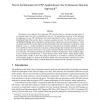Free Online Productivity Tools
i2Speak
i2Symbol
i2OCR
iTex2Img
iWeb2Print
iWeb2Shot
i2Type
iPdf2Split
iPdf2Merge
i2Bopomofo
i2Arabic
i2Style
i2Image
i2PDF
iLatex2Rtf
Sci2ools
117
click to vote
SPAA
2003
ACM
2003
ACM
Novel architectures for P2P applications: the continuous-discrete approach
We propose a new approach for constructing P2P networks based on a dynamic decomposition of a continuous space into cells corresponding to servers. We demonstrate the power of this approach by suggesting two new P2P architectures and various algorithms for them. The first serves as a DHT (Distributed Hash Table) and the other is a dynamic expander network. The DHT network, which we call Distance Halving, allows logarithmic routing and load, while preserving constant degrees. It offers an optimal tradeoff between the degree and the path length in the sense that degree d guarantees a path length of O(logd n). Another advantage over previous constructions is its relative simplicity. A major new contribution of this construction is a dynamic caching technique that maintains low load and storage even under the occurrence of hot spots. Our second construction builds a network that is guaranteed to be an expander. The resulting topologies are simple to maintain and implement. Their simplici...
Constant Degree | Distributed And Parallel Computing | Dynamic Expander Network | Path Length | SPAA 2003 |
Related Content
| Added | 05 Jul 2010 |
| Updated | 05 Jul 2010 |
| Type | Conference |
| Year | 2003 |
| Where | SPAA |
| Authors | Moni Naor, Udi Wieder |
Comments (0)

